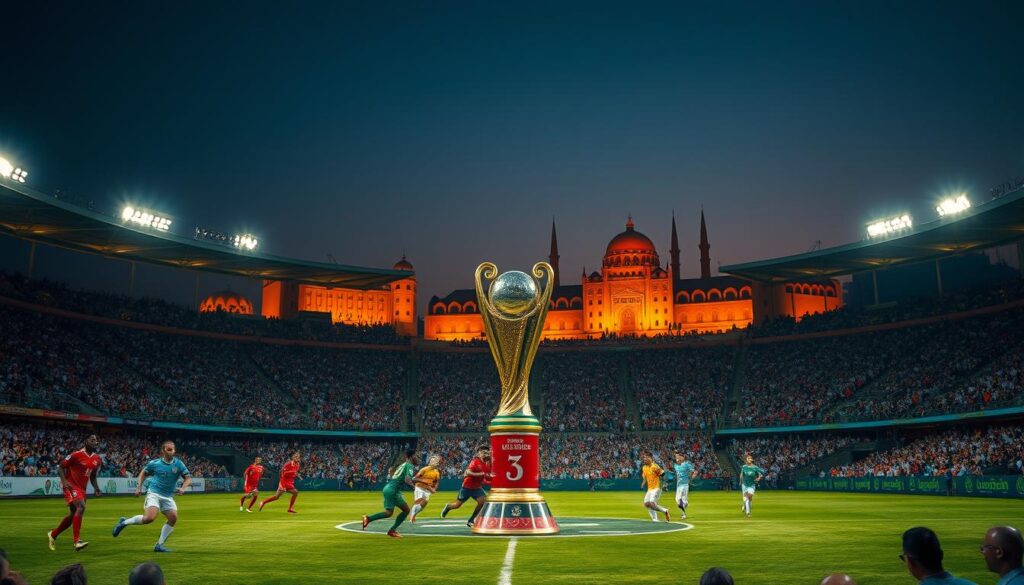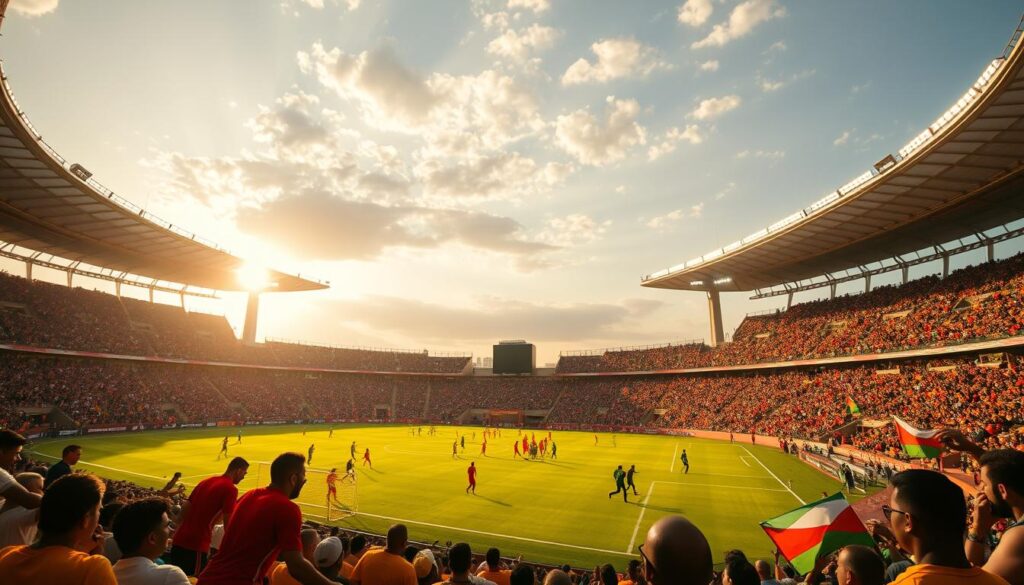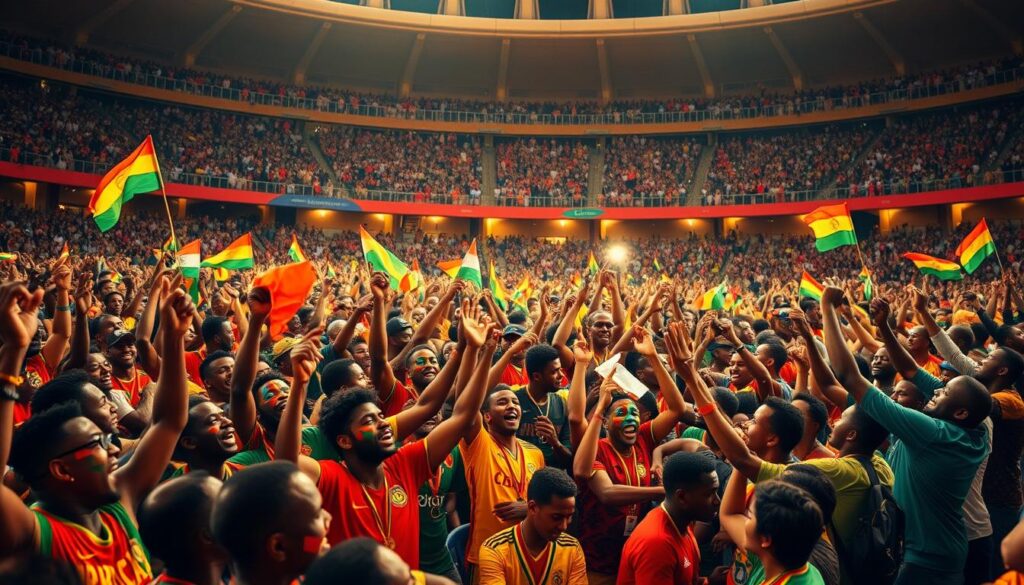The Africa Cup of Nations evolved from having 8 participating teams in 1988 to currently hosting 24 teams for the tournament this year. The continent shows increasing interest in football through its growing tournament popularity since its expansion from 8 teams to 24. The 2025 hosting of the tournament by Morocco will make history for African sports and international football.
As a country experienced in world-class event hosting Morocco guarantees that fans will receive premier event organization while experiencing exhilarating event atmospheres. Recent football tournament success by the nation has built intense excitement which encourages worldwide sports fans to watch this event.
Beyond football this event serves to unite the nation along with forging a strong display of national pride. Football fans count the days until the upcoming tournament when they can celebrate extraordinary games and extraordinary moments of the prestigious championship.
Key Takeaways
- The Africa Cup of Nations increased its participant teams from eight to twenty-four since its inception in 1988.
- Morocco sets to organize the tournament in 2025 while demonstrating its ability to deliver top-tier international sporting events.
- Audiences attending this event will find complete premium services supported by high-class execution and intense excitement.
- This Africa Cup tournament honors both African football along with national values of pride.
- The Africa Cup promises spectators a blend of intense matches alongside unforgettably memorable sporting experiences for all fans of the sport.
- Overview of the Africa Cup in Morocco
Major football event preparations are in full swing for the 2025 championship which all fans around the world eagerly await. A total of 24 teams will participate for victory through matches organized in stellar stadiums during the event. Every moment throughout the tournament starting from the first kickoff till the championship finale guarantees thrilling gameplay.
What Fans Can Expect
Every match during the group stage will be critical since they could decide how the teams progress in this tournament. The knockout matches create additional tense moments because they are based on sudden-death rules which produce unforgettable football moments. The tournament contains more factors than competitive events since it represents a festival which binds nations together through their pride.
Game-time clashes featuring elite teams will attract fanatical excitement during the tournament. The 2025 competition guarantees consummate football memories by featuring either major power showdowns or amazing underdog displays.
Key Dates and Event Details
The Africa Cup tournament will start its games on December 21, 2025 before reaching its culminating game on January 18, 2026. The event schedule includes the following stages:
- Group Stage: December 21, 2025 – January 3, 2026
- Knockout Rounds: January 6 – January 18, 2026
- Final Match: January 18, 2026
Every match during the tournament will take place at historical stadiums that allow spectators to attend world-class football events. The tournament uses its organizational structure to maintain continuous competition through game-by-game development of the overall championship storyline.
The upcoming tournament edition establishes a memorial to showcase both the dedication and skills of African football.
The upcoming tournament demands fans to organize their days ahead because it offers a historic experience that people will remember forever. New information will be introduced through additional sections available exclusively for readers.
Historical Context and Morocco’s Hosting Legacy
The exceptional football hosting legacy of Morocco prepares the nation for an ecstatic experience during the 2025 tournament. The country marked its first time as Cup Nations host in 1988 which established a significant milestone in its sporting chronology. At its beginning the competition had eight participating teams during its early developmental phase.
The nation has achieved major progress in its infrastructure development alongside better organizational capabilities post-1988. The nation has developed superior capabilities to organize large-scale events after several decades. The recent football achievements especially the record-breaking performance in the 2022 FIFA World Cup solidified Morocco’s status among top hosting nations.
A Return to Morocco: A Brief History
Organizing the 2025 tournament stands as proof of Morocco’s continuous dedication to both football and hosting international events. The nation used the knowledge gained from its 1988 tournament to build its modern tournament capabilities. Through the decades Morocco invested significant funds into building modern facilities and infrastructure for stadiums and transportation along with hospitality services to provide perfect experiences for players and viewers alike.
Morocco’s Experience with Major Tournaments
The country stands unquestionably distinguished as a leader among organizations for its experience in hosting events under intense pressure conditions. The country has maintained solid achievements throughout all international competitions starting from 1988 up until recent international tournaments. The accumulated tournament hosting experience of Morocco serves to generate great anticipation among spectators ahead of the following international competition.
The 2025 tournament goes beyond competition status by recognizing the country’s football milestones through a celebration of its leadership in African football development. Event fans can anticipate a premium event because it reveres history while steering toward forthcoming opportunities.
Morocco demonstrates its love for football together with its commitment to top-level performance through successful major event hosting.
The start of the 2025 countdown has intensified the enthusiasm throughout the country. Morocco has established itself as a competent stadium organiser which guarantees that this tournament will be recorded in history as a landmark sporting event.

Tournament Format, Schedule, and Venues
Fans can expect an unmatchable sporting journey at the 2025 tournament thanks to its innovative tournament structure and high-class stadiums. Twenty-four participating teams will start the tournament through a round-robin phase which splits them into six groups. The tournament splits 24 teams into six groups where these teams play three matches until only the top two teams from each group advance to continue competition in the knockout rounds.
Group Stage Structure and Knockout Rounds
The group stage competition will extend from December 21, 2025 until January 3, 2026. A round-robin points competition system guarantees that each match holds extreme importance in the tournament. After January 6, 2026, the knockout phase begins with Round of 16 games before moving into quarterfinals and semifinals which ends with the final on January 18, 2026.
The format designed for the competition creates consistent momentum because each contest contributes directly to building the competition’s overall storyline. Every knockout round match will become particularly dramatic because teams must succeed via sudden death eliminations.
Iconic Stadiums and Host Cities
Every match of the tournament will take place at six illustrious stadiums which combine superior sports infrastructure with deep football historic heritage.
The decision-making draw scheduled in Rabat will establish groups and pair players from different sides before the start of an anticipated competition. The venues demonstrate the host’s dedication to creating a superior global competition experience.
This finals tournament offers spectators memorable contests performed at famous venues that create a dual celebration of football and national pride. Future analysis about team qualifications and match draws will appear in the following information section.
Deep Dive into Team Qualifications and Match Draws
Competing for 48 nations led to an exciting qualification process which paved their way to secure participation in the 2025 tournament. Teams had to participate in various stages of qualification which produced a demanding journey to reach the tournament. Each competition became unmissable because strong participants alongside decisive strategic moves shaped essential matchups during matches.
The Qualifying Journey and Competitive Groups
This tournament divided countries into competition groups to allow every nation the chance to achieve better results than their counterparts. North and South American teams controlled their groups although Ireland and Chile created key upsets during the stage. Traditional superpowers Egypt and Nigeria demonstrated their athletic superiority to the world at the same time equatorial guinea emerged as an unexpected challenge during the competition.
The knockout phase intensified further because teams had to win by scoring more goals than their opponents. Each game required complete skill along with absolute determination from the players who wanted to progress toward the following round.
Insights into the Final Draw and Match Schedules
Rabat hosted the final draw that established the competitive group distributions. The decisive event determined critical elements that formed the tournament’s storyline. Steel yourself for the upcoming results because fans demonstrated great excitement towards identifying which matches and fierce rivalries the drawing process had created.
The game organizers distributed matches between famous locations as a strategy to produce continuous enthusiasm among fans. Each match in its entirety starting from the group phase until reaching the final promised extraordinary emotions to spectators.
Multiple national football teams stratified their participation in the tournament by advancing through qualifying series.
| City | Stadium | Capacity |
|---|---|---|
| Casablanca | Stade Mohammed V | 67,000 |
| Rabat | Prince Moulay Abdellah Complex | 53,000 |
| Marrakech | Grand Stade de Marrakech | 45,000 |
| Tangier | Stade Ibn Batouta | 65,000 |
| Agadir | Stade Adrar | 45,000 |
| Fez | Complexe Sportif de Fès | 45,000 |
Both south africa and Côte d’Ivoire maintained their dominant form in their qualification process. The team moved forward with team spirit and unwavering dedication to win the championship title.
The tournament established itself as a vital space where established teams met rising stars in addition to the established teams. Competitive team spirit and passionate energy among all participants established an unforgettably exciting atmosphere for this event.
During qualification teams demonstrated the extensive athletic abilities present in African football while showing how competitive the sport remains.
When the competition is about to start the attention concentrates on understanding the upcoming contests and their narrated outcomes. The path to 2025 demonstrates the deep commitment that blanketly unified all players along with nations in the competition.
iedade Moriocco will host the africa cup which will elevate both African football and nationwide pride further.
The upcoming 2025 tournament will transform the sporting direction of African football through an event that unites the nations for skillful athletic expression and national togetherness. Beyond being a tournament the event serves as both a talent showcase for African performers while creating united national pride for the continent.
The modern infrastructure at Morocco functions as the main factor behind delivering an uninterrupted experience for fans along with athletes. The country implements modern stadiums and facilities which demonstrate its dedication to hosting internationally prestigious sports events. These facilities function beyond traditional sporting spaces since they represent landmarks of progress and highest achievement standards.

Morocco’s Modern Infrastructure and Fan Culture
The passionate support of Moroccan fans elevates the tournament to new heights. The fans add electric energy to matches which results in every game becoming an unforgettable show. Fans in Morocco display their passion through active support because the soccer tradition represents their united sports spirit.
Morocco’s position as a frontrunner in contemporary football infrastructure and event management becomes permanent through hosting this event. The 2025 tournament will be extraordinary because Morocco has already established itself as an effective host for major tournaments.
The tournament creates deep national pride levels as it influences the entire African football community outside of sports facilities. The tournament motivates upcoming football stars in Africa as it strengthens the continent’s worldwide importance. The event will honor both the history of the sport and its present status along with its upcoming directions.
The upcoming 2025 tournament represents how football strengthens national bonds and mobilizes new fans every year.
The upcoming days intensify the level of anticipation among the fans. Fans will experience a fundamental shift during this historic moment that will mark a significant point in African football history.




